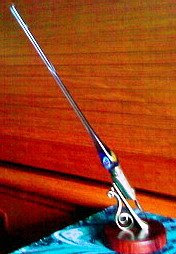
Search for ways to add conflicting emotions to your fictional characters or the personas used to write poetry. To mine for emotions and discover where words will take you, experiment with these mood sets:
grateful empathic playful admiring secretive jubiliant
anxious fearful angry remorseful lonely rejected
The first line includes upbeat feelings. The lower line delves into the frustrations and negative feelings. Add others.
Use a spiral notebook for this exercise so you may move with ease through the pages. Begin by writing the first word in the pair across the top of your page.
Write for at least two pages to express every thought or feeling that the word arouses. If you need more information on freewriting, scroll down to my post on Wordling. Then switch and write at the top of the next page the word that appears beneath your chosen word.
Write for two pages about the emotion listed beneath it. Don't forget to use all the senses. After the writing session take a break. When you return, write for a page about what the mind has churned up regarding these moods. Do you see a character developing that intrigues you?
Become willing to go into uncomfortable places. If you have secrets to tell, create a character to reveal them. Do this by writing a first name when the idea arises and use dialogue to push the idea forward or write in third person. Let the writing amuse and surprise you.
Don't analyze or critique the results. See if you can generate the mood you write about. During your writing, do not stop or re-read what you have written. If you become sidetracked, let the writing flow where it wants.
Creative Write: Begin a story or poem with a potential character you've Wordled into life.
The first line includes upbeat feelings. The lower line delves into the frustrations and negative feelings. Add others.
Use a spiral notebook for this exercise so you may move with ease through the pages. Begin by writing the first word in the pair across the top of your page.
Write for at least two pages to express every thought or feeling that the word arouses. If you need more information on freewriting, scroll down to my post on Wordling. Then switch and write at the top of the next page the word that appears beneath your chosen word.
Write for two pages about the emotion listed beneath it. Don't forget to use all the senses. After the writing session take a break. When you return, write for a page about what the mind has churned up regarding these moods. Do you see a character developing that intrigues you?
Become willing to go into uncomfortable places. If you have secrets to tell, create a character to reveal them. Do this by writing a first name when the idea arises and use dialogue to push the idea forward or write in third person. Let the writing amuse and surprise you.
Don't analyze or critique the results. See if you can generate the mood you write about. During your writing, do not stop or re-read what you have written. If you become sidetracked, let the writing flow where it wants.
Creative Write: Begin a story or poem with a potential character you've Wordled into life.






































